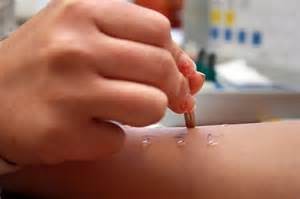 Many adults and children suffer from allergies, which cause tearing in the eyes, runny noses, and even respiratory problems. Allergy immunotherapy, also known as allergy shots seem to have a beneficial effect on the allergic response of substances they are allergic to. Before allergy shots can begin, your doctor will test you to see what substances you are allergic to. With allergen immunotherapy, the doctor administers a tiny bit of an allergen just under the skin with injections or skin pricks, and the body’s immune system attacks the allergen. At regular intervals (once or twice per week) for 6 months to a year, you will be exposed to larger doses of the allergen, so that his/her immune system can build up an immunity to the allergen. To maintain immunity to certain allergens, you may have to take maintenance doses of allergy shots for a period of 3 to 5 years.
Many adults and children suffer from allergies, which cause tearing in the eyes, runny noses, and even respiratory problems. Allergy immunotherapy, also known as allergy shots seem to have a beneficial effect on the allergic response of substances they are allergic to. Before allergy shots can begin, your doctor will test you to see what substances you are allergic to. With allergen immunotherapy, the doctor administers a tiny bit of an allergen just under the skin with injections or skin pricks, and the body’s immune system attacks the allergen. At regular intervals (once or twice per week) for 6 months to a year, you will be exposed to larger doses of the allergen, so that his/her immune system can build up an immunity to the allergen. To maintain immunity to certain allergens, you may have to take maintenance doses of allergy shots for a period of 3 to 5 years.
Allergen immunotherapy helps to induce an immune system response to the allergen. Your body creates antibodies, which attack a specific allergen. This response builds your immune system, so that the next time you come into contact with the same kind of allergen your response will be lower. You may receive a number of allergy shots over a certain period of time, and each time the dose of the allergen will be just a tiny bit bigger. The bigger the dose of the allergen received by the child, the bigger the antigen response from his/her immune system. The primary goal of allergen immunotherapy is to remove the allergic response to an allergen, so the individual will no longer suffer from the allergy.
 If your child is allergic to bee stings, or pollen, he/she may benefit from allergen immunotherapy. Pollen often causes respiratory problems, swollen sinuses, runny noses, as well as swollen and runny eyes. Bee stings can be life threatening for children and adults. For bee sting allergies, and other stinging insect allergies, the doctor will administer a tiny bit of diluted venom. If you have been stung by a bee recently your doctor may want to wait a certain amount of time before testing your for the allergy and subsequently treating your immune system. For many people with bee sting allergies, allergen immunotherapy does help to reduce the allergic response. This type of allergy treatment may reduce the need for an Epi-pen, if the allergy shots work. People who get allergen immunotherapy for bee stings must be observed for 45 minutes after a treatment to be sure there is no sign of anaphylactic shock. This therapy is about 80 percent effective for immunity to bee stings.
If your child is allergic to bee stings, or pollen, he/she may benefit from allergen immunotherapy. Pollen often causes respiratory problems, swollen sinuses, runny noses, as well as swollen and runny eyes. Bee stings can be life threatening for children and adults. For bee sting allergies, and other stinging insect allergies, the doctor will administer a tiny bit of diluted venom. If you have been stung by a bee recently your doctor may want to wait a certain amount of time before testing your for the allergy and subsequently treating your immune system. For many people with bee sting allergies, allergen immunotherapy does help to reduce the allergic response. This type of allergy treatment may reduce the need for an Epi-pen, if the allergy shots work. People who get allergen immunotherapy for bee stings must be observed for 45 minutes after a treatment to be sure there is no sign of anaphylactic shock. This therapy is about 80 percent effective for immunity to bee stings.
If you are pregnant, you may not be able to take treatment for allergies. If you discover you are pregnant after starting allergy shots, be sure to consult with your doctor before continuing with them. Children age 5 years or younger may not be able to take treatment for his/her allergies. People taking certain types of medicines, such as beta blockers, for heart disease are not eligible to take allergen immunotherapy.
 It can take up to 6 months before you start feeling better after starting allergy shots. You might even wonder if taking the shots are worth the time and money. For many people it is worth the time and expense, because some people cannot take antihistamines, and other anti-allergy medications. For some people, allergies to pollen can cause severe breathing problems in some people, and medications may not be effective.
It can take up to 6 months before you start feeling better after starting allergy shots. You might even wonder if taking the shots are worth the time and money. For many people it is worth the time and expense, because some people cannot take antihistamines, and other anti-allergy medications. For some people, allergies to pollen can cause severe breathing problems in some people, and medications may not be effective.
People who are severely allergic to bee stings often have to keep an emergency dose of epinephrine, an Epi-pen, with them at all times to prevent anaphylactic shock. If allergen immunotherapy is an effective treatment for bee sting allergies, it is well worth the time and expense involved to reduce your allergic response. If you are taking immunotherapy for bee stings, this is a long term treatment, and may not reduce your need for an emergency Epi-pen injection if you were to be stung while under treatment. You should eventually become immune to bee stings, but it could take a long time. Always keep an Epi-pen with you at all times for an emergency injection of epinephrine, if needed.
Related Articles
